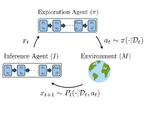Aldo Pacchiano
Assistant Professor / Visiting Scientist
Boston University / Broad Institute of MIT and Harvard
I am an Assistant Professor at the Boston University Center for Computing and Data Sciences and a Visiting Scientist at the Schmidt Center of the Broad Institute of MIT and Harvard. I obtained my PhD at UC Berkeley where I was advised by Peter Bartlett and Michael Jordan. My research leverages the principles of sequential decision making to design intelligent and adaptive systems. I aim to advance our statistical understanding of learning phenomena in adaptive environments and translate these insights into the design of AI systems for autonomous discovery in large scale scientific and societal domains.
The Pacchiano’s Lab for Adaptive and Intelligent Algorithms (PLAIA) site can be found here.
A sample of my literary writings, including short stories and notes in both English and Spanish, can be found here.
Interests
- LLMs and Discovery
- Reinforcement Learning
- AI for Science
- Theory of Sequential Decision-Making
Education
-
PhD in Computer Science, 2021
University of California Berkeley
-
MEng in Computer Science, 2014
Massachusetts Institute of Technology
-
Masters of Advance Study in Pure Mathematics, 2013
Cambridge University
-
Bachelors of Science in Computer Science and Theoretical Mathematics, 2012
Massachusetts Institute of Technology




